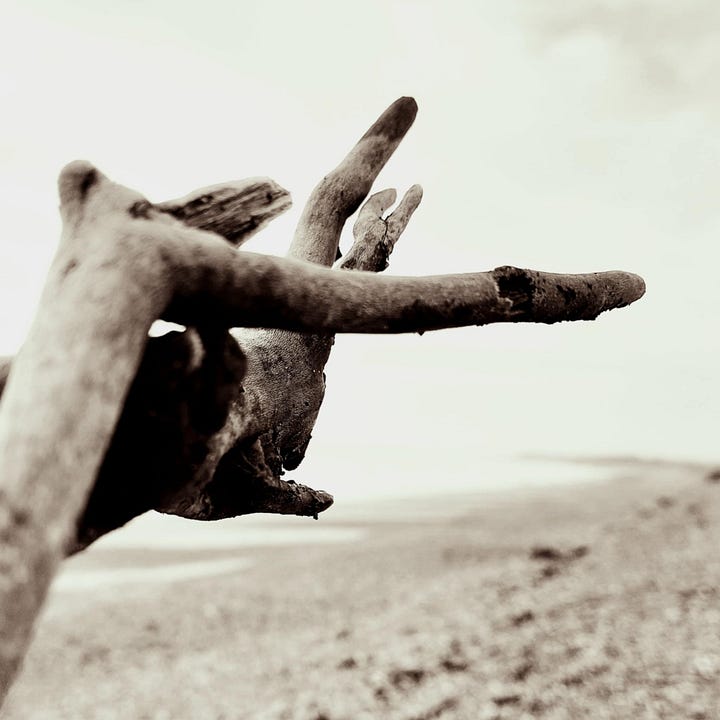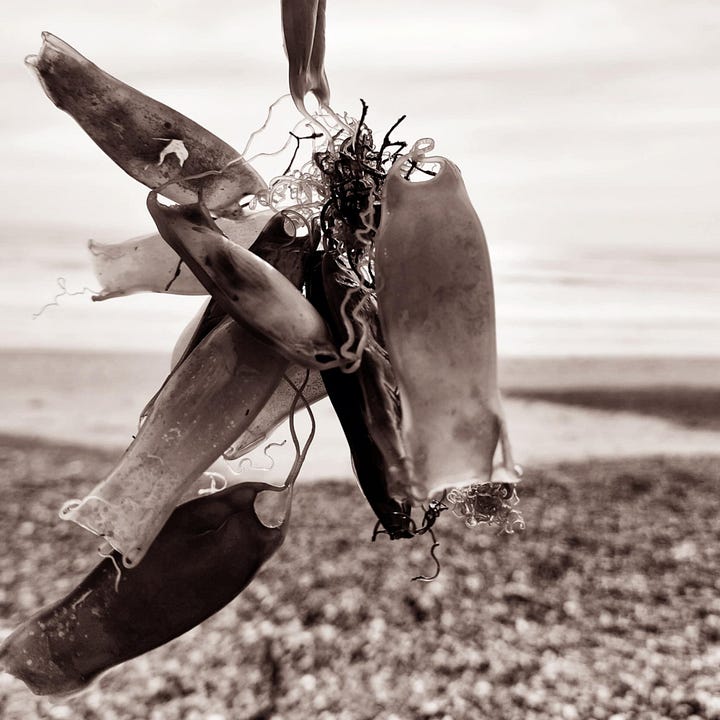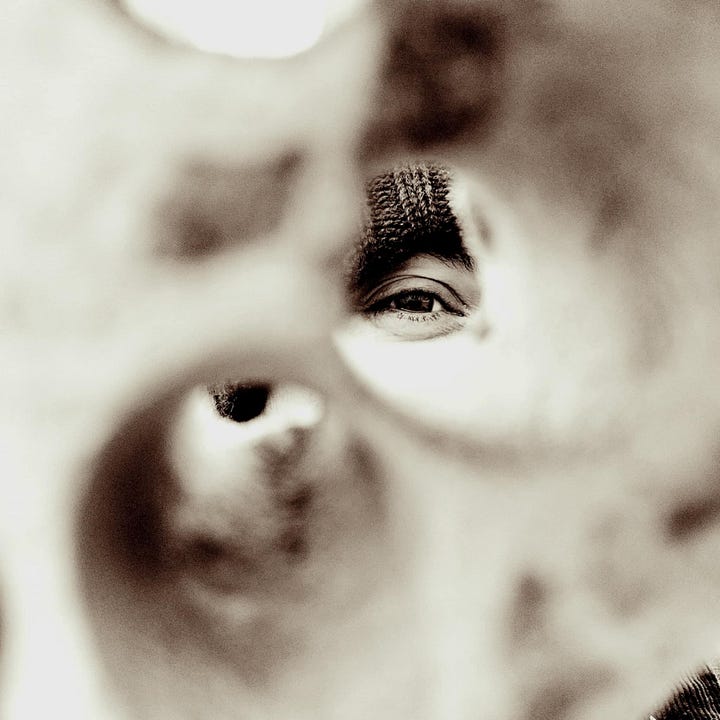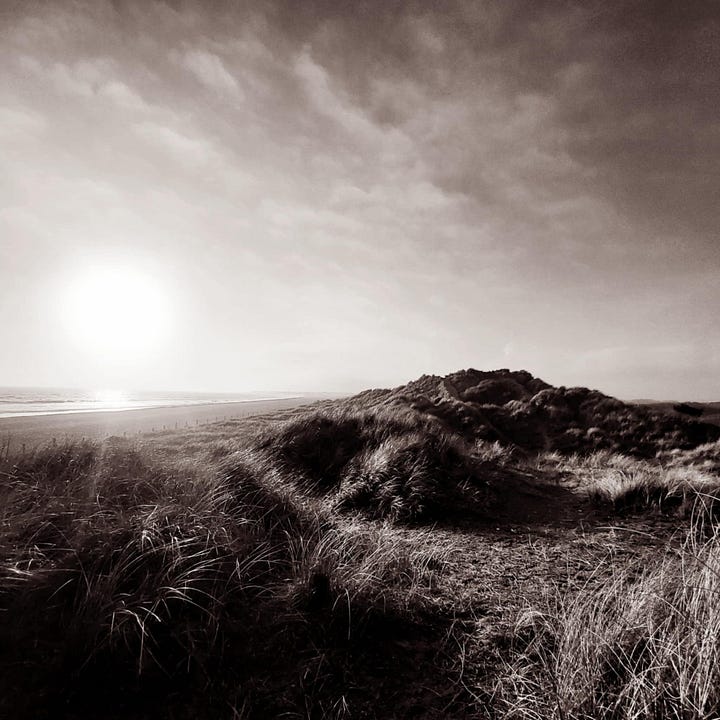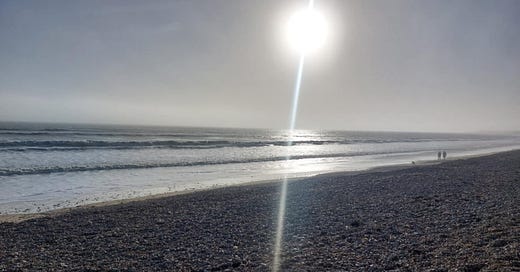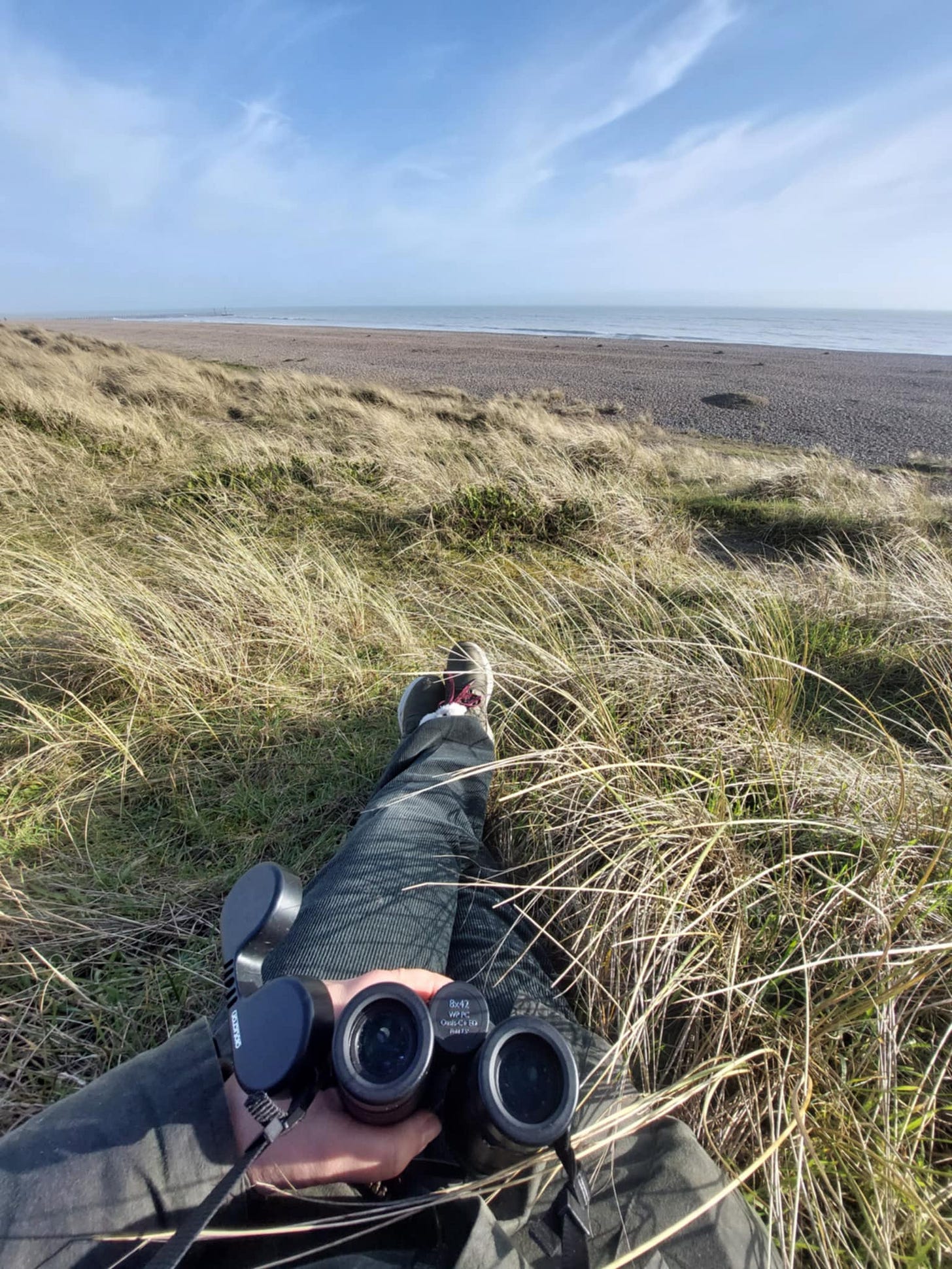I dreamt of a whale. Barnacles. My own skin wind-eroded, salt-singing, wet with spray from the waves that is really bright-eyed tears. A seaweed slick of childhood lathered on rocks. Salt shaker sky with grains of gulls. The feeling in your legs just before you run: run and spin arms out, a shout that might have come from you but sounds so lost and distant in the wide wide ferociousness of it all. Barnacle tight and gull wheel wide. A lung-full seems such a small amount of air.
Winter has always been my favourite time to visit the beach; we used to come here when I was a child. Mum, Dad, and me.
Bundled up in coat and wellingtons, a bobble hat that was always working its way crookedly down over my eyebrows. Mum would wear a headscarf like The Queen, to stop the wind making her ears ache. Dad would lean on the outside of the car, smoking a cigarette whilst Mum and I poured over field guides trying to identify gulls from the colours of their legs. I don’t remember my brother on these trips: all knees and elbows he is four years my senior so a teenager by the time these memories kick in, and computers held more fascination than birds. We didn’t see much of each other outside of mealtimes then, until grown. The end of a long walk, the three of us would trudge back up the gravel strewn car park, me usually dragging my feet a few metres behind, face stinging and thrilled by the cold salt laden air, and I’d eventually slump onto the hard booster seat in the back of the hatchback, damp sand crusted trousers creasing and sticking to the back of my legs. The contrast of still, warm, quiet, as the car door slams shut, instantly cutting off the weather buffeting outside. A plastic carrier-bag of seaweed, 'cool rocks' and shells to be emptied on to newspaper spread across the kitchen floor and laid out for study. I’d kneel for an hour on the hard lino, picking up one, then another. Always disappointed how pebbles lost their shine and lustre when they dried. Gently sorting the shells into groups on the damp newsprint: Topshell, Dog Welk, Slipper Limpet, Oyster. A prize peach Queen Scallop with only a little chip missing. Muscles, and Limpets. Until Mum said it was time for tea, and homework. I’d be reluctant then to wash my hands, the tightness of skin and the smell of salt lingering and holding Monday morning at bay.
I live less than a half-hour’s drive from the coast, yet my visits are rare. Too rare, I have decided, the memory of wind and salt still fresh in my nostrils from yesterday’s walk.
We arrived late morning, almost bang on low tide. The car park was busy, but the beach was not too crowded; dogs and duffle coats and woolly hats – it is still February, and West side of the river’s mouth is wilder, the sounds of water-side amusements from the opposite bank blown away by a wind that tells of dune and silvered Marram Grass and Gorse and rippled, riddled sands. The boardwalk was just how I remembered; a winding rumble-strip that weaves up and over the dune and spills you out onto pebble. A strata of signage pops up through the vegetation on either side; each generation weathered and faded and stapled over with a new layer in varying stages of passive aggressive language. “Restricted access: this area has been fenced to protect rare plant species for your future.” “No campfires. No dog Fouling. Keep out of fenced areas.”
“Bylaws apply to this area.”
“This is not a nudist beach.” Gorse is in full bloom; golden in the spring sunshine.
A golf course sprawls right up to the edgeland, fenced in by barbs of wire and the gorse. The fences rust their way around the fragile strip of sand dune too, that builds and shifts between the golfers and the pebbles, although the dune has sneaked under the strands in places, rolling and bleeding out onto the beach as through it too wants to peer over the shingle bank to check the sea is still there.
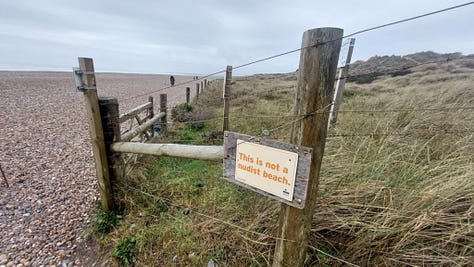
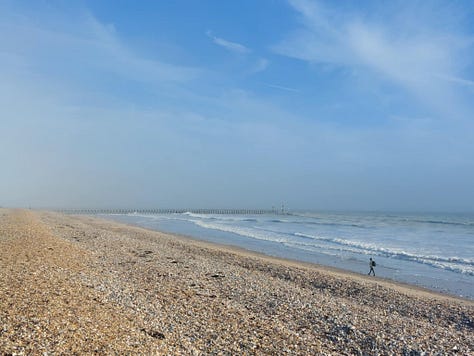
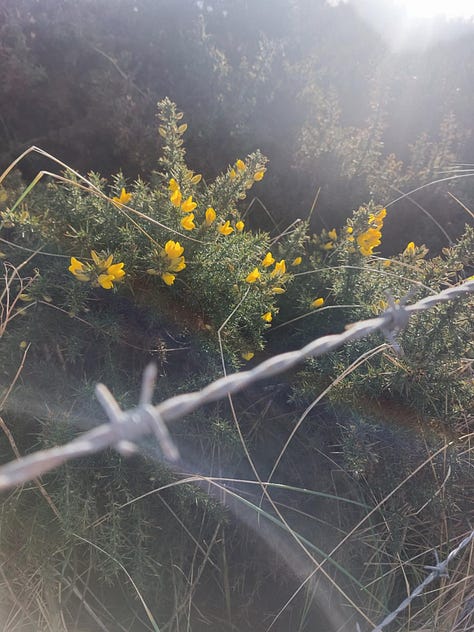
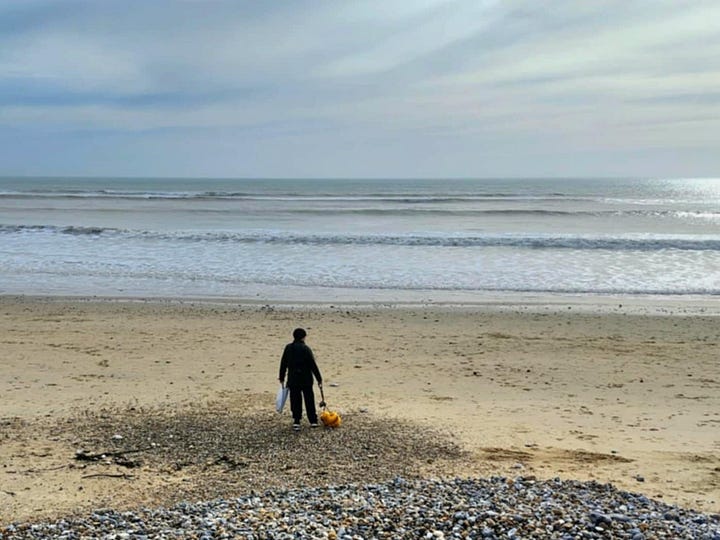
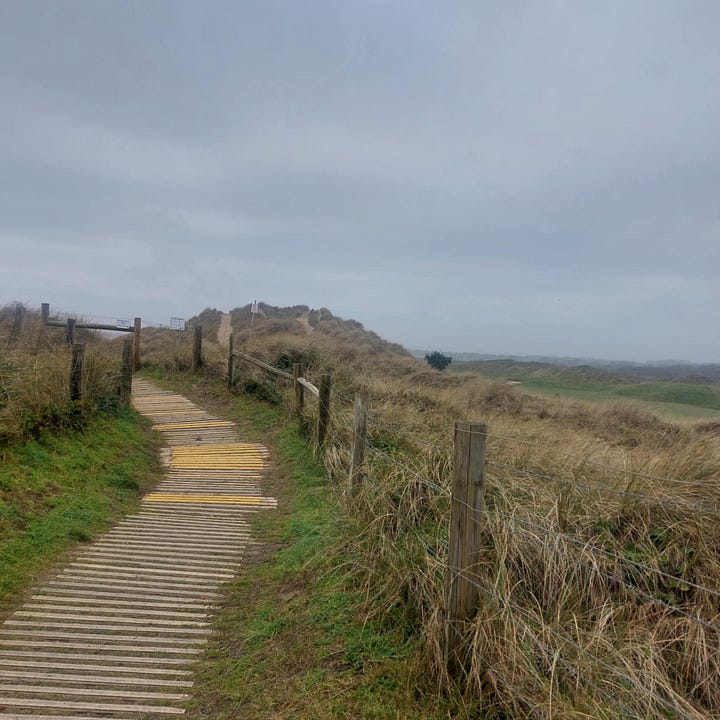
Gorse, dune, shingle, sand, birds, waves.
I raised my binoculars. The birds were oystercatchers in their always-so-formal attire; black and white, long red bills probing the sands. I readjusted my focus and another group of smaller birds swam into clarity; Sanderling. Silvery little wading birds, with shorter bills and legs that move beneath their bodies with rapid clockwork motion; thin and dark as though inked in stick figure’s legs.
I had brought an empty jamjar, wedged in the pocket of my wax-cotton coat (one with the check lining, just like my Mum’s) and it slowly gathered a filling of little trinkets; a hag stone, some snips of coloured rope, a gull feather, bright nuggets of sea glass, a Piddock shell. I stopped frequently, to stare out over the waves across the open water, hoping to catch glimpse of a grey form amidst the grey rollers – a shape of whale.
This winter, a scattering of more than a few sightings have been reported, of Humpback Whales, seen from the Sussex coastline. Most were from further east, where the clifftops of Birling Gap and Eastbourne offer vantage, but there seemed a tantalising chance.
Later in the afternoon, with the tide coming in, I secreted myself on the side of a dune, and watched. Crow, People, Dogs, Wave, four Brent Geese West. No Whale. The weather turned as I watched, a fret of sea-spray moving inland, slowly blurring any definition between sea and sky, the water turning pewter grey. I walked down to the waters edge for a final time, and crouched, fingers dangling to tempt a wave. A few rolled in, and slipped away, not quite within reach. And then, one came surging up the sands, and swirled deeply around my position, sending me scrambling to my feet and racing the foam up the beach in childlike glee.
For a moment, there was no thought, no anxious niggling or awareness of body; just sea and air and existence and a delighted squeal of deep joy that bubbled up and echoed with the gulls.
The Sanderling were still there, busy at the edge of the wash, lifting and moving along a few metres at the disturbance of a loose dog, or the advance of the tide.
